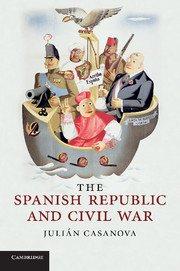Book contents
- Frontmatter
- Contents
- List of maps
- Chronology
- Introduction
- Part I Republic
- 1 The winds of change
- 2 The constraints of democracy
- 3 Order and religion
- 4 Reshaping the Republic
- 5 The seeds of confrontation
- Part II Civil war
- Epilogue: Why did the Republic lose the war?
- Glossary
- Appendix 1 Leading figures
- Appendix 2 Political parties and organisations
- Index
- References
3 - Order and religion
Published online by Cambridge University Press: 05 June 2012
- Frontmatter
- Contents
- List of maps
- Chronology
- Introduction
- Part I Republic
- 1 The winds of change
- 2 The constraints of democracy
- 3 Order and religion
- 4 Reshaping the Republic
- 5 The seeds of confrontation
- Part II Civil war
- Epilogue: Why did the Republic lose the war?
- Glossary
- Appendix 1 Leading figures
- Appendix 2 Political parties and organisations
- Index
- References
Summary
Religion was a basic component of many of the conflicts that had spread throughout Europe in the period between the two world wars. The Russian revolution and the fear of Communism taking root elsewhere gave rise to a conservative mass reaction that in some countries, such as Germany, Austria, Italy and Poland, took the form, even before the appearance of Fascism, of a popular Catholic movement. The antagonism between the Catholic Church and the political left acquired fresh vigour. However, nowhere was the struggle between the Catholic Church and the various socialist projects, between clericalism and anticlericalism, so intense as in Spanish society in the 1930s. The conflict had deep historical roots, but the coming of the Republic and its attempts to modernise society and politics by debilitating the power of the clergy revealed it in all its harsh reality. The result was the birth of the first mass right-wing party in the history of Spain, a party that played a major role in the hounding and overthrow of the Republic.
Religion, ‘the seed of discord’
In the years prior to the proclamation of the Republic, the Catholic Church, under the protective mantle of Primo de Rivera's dictatorship, envisaged no serious changes in store for its privileged position. In spite of the disentailments of Church property and the liberal revolutions of the nineteenth century, the confessional state had remained intact. Catholicism saw itself as the historical religion of the Spanish.
- Type
- Chapter
- Information
- The Spanish Republic and Civil War , pp. 64 - 93Publisher: Cambridge University PressPrint publication year: 2010



